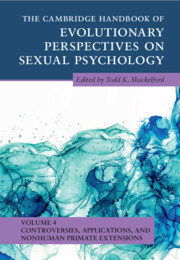Book contents
- The Cambridge Handbook of Evolutionary Perspectives on Sexual Psychology
- The Cambridge Handbook of Evolutionary Perspectives on Sexual Psychology
- Copyright page
- Contents
- Contributors
- Preface
- Part I Controversies and Unresolved Issues
- Part II Applications to Health, Law, and Pornography
- 6 Male Reproductive Health
- 7 Women’s Menstrual Cycles and Ovulation Provide Balanced Estradiol and Progesterone for Fertility and Lifelong Health
- 8 Female Genital Cutting
- 9 Costs of Polygyny
- 10 Male Sexual Disorders
- 11 An Evolutionary Perspective on Female Sexual Concerns and Dysfunctions
- 12 Evolutionary Perspectives on Male Sexual Offending
- 13 Pornography and Male Sexual Psychology
- Part III Nonhuman Primate Sexual Behavior
- Index
- References
11 - An Evolutionary Perspective on Female Sexual Concerns and Dysfunctions
from Part II - Applications to Health, Law, and Pornography
Published online by Cambridge University Press: 30 June 2022
- The Cambridge Handbook of Evolutionary Perspectives on Sexual Psychology
- The Cambridge Handbook of Evolutionary Perspectives on Sexual Psychology
- Copyright page
- Contents
- Contributors
- Preface
- Part I Controversies and Unresolved Issues
- Part II Applications to Health, Law, and Pornography
- 6 Male Reproductive Health
- 7 Women’s Menstrual Cycles and Ovulation Provide Balanced Estradiol and Progesterone for Fertility and Lifelong Health
- 8 Female Genital Cutting
- 9 Costs of Polygyny
- 10 Male Sexual Disorders
- 11 An Evolutionary Perspective on Female Sexual Concerns and Dysfunctions
- 12 Evolutionary Perspectives on Male Sexual Offending
- 13 Pornography and Male Sexual Psychology
- Part III Nonhuman Primate Sexual Behavior
- Index
- References
Summary
Sexual concerns and dysfunctions are common, complex, and result in significant distress for individuals and couples.In spite of the vital role sex plays in our lives, defining sexual function and dysfunction is complicated by the multitude of variables impacting sexual behavior: biological, instinctual, emotional, interpersonal, social, cultural, as well as personal sexual history.Further, our understanding of human sexuality is currently in flux in response to changing sociocultural interpretations.The inconsistency with which we currently define typical sexual function is complicated by our incomplete understanding and acknowledgement of how evolutionary influences impact sexual function.Human sexuality is influenced not only by our socially constructed ideals, but also by a deeper physiology that transcends cultural ideals and understanding. In this chapter, we argue that some proportion of a person’s sexual experience is generated via unconscious means through evolutionary forces manifesting as innate reactions and desires.These evolutionary influences manifest in human sexual behavior in nuanced yet profound ways.Thus, conscious sociocultural decisions about what constitutes “appropriate” sexual function may be of limited value in the privacy of people’s bedrooms without embracing evolution’s impact. The unfortunate tendency to disregard evolutionary biology by the mental health community leaves patients with an incomplete understanding of their sexual and relationship struggles.Further, this lack of understanding risks our labeling typical female sexual function as dysfunctional, and translates into less effective treatments for those suffering with sexual concerns.Evolutionary theory does not offer insight into all human sexual function and dysfunction.However, it is a relevant aspect of the story for many individuals who struggle sexually.Acknowledging our sexual adaptations and instinctive tendences results in less pathologizing of sexual desires, less shaming of ourselves and others, and less self-blame and personalization of a partner’s sexual inclinations.Sexual satisfaction and self-acceptance have dramatic implications in people’s lives and relationships that extend far outside the bedroom.Sexual satisfaction impacts relationship satisfaction and even life satisfaction.Clinical experience reveals how encouraging the sexual vulnerability inherent in our more primitive sexual tendencies make sex more satisfying, and perhaps more importantly, it deepens lovers’ emotional connection. The most loving, open-minded thing we can do for ourselves is to embrace our humanness, rather than deny it.This chapter explores ways evolutionary forces may impact female sexual function and dysfunction.Greater clarity on evolutionary influences impacting people’s sexual experience can support women and their partners in creating the sex lives they long for, as well as assist medical practioners in developing more targeted and thus more effective treatment plans for their patients.
Keywords
- Type
- Chapter
- Information
- Publisher: Cambridge University PressPrint publication year: 2022

